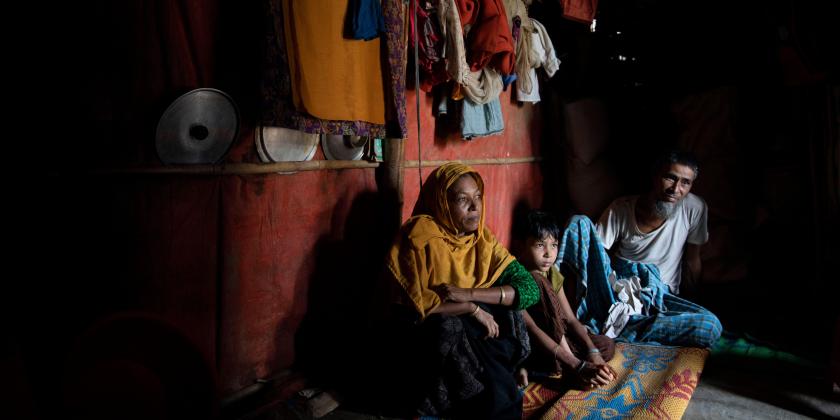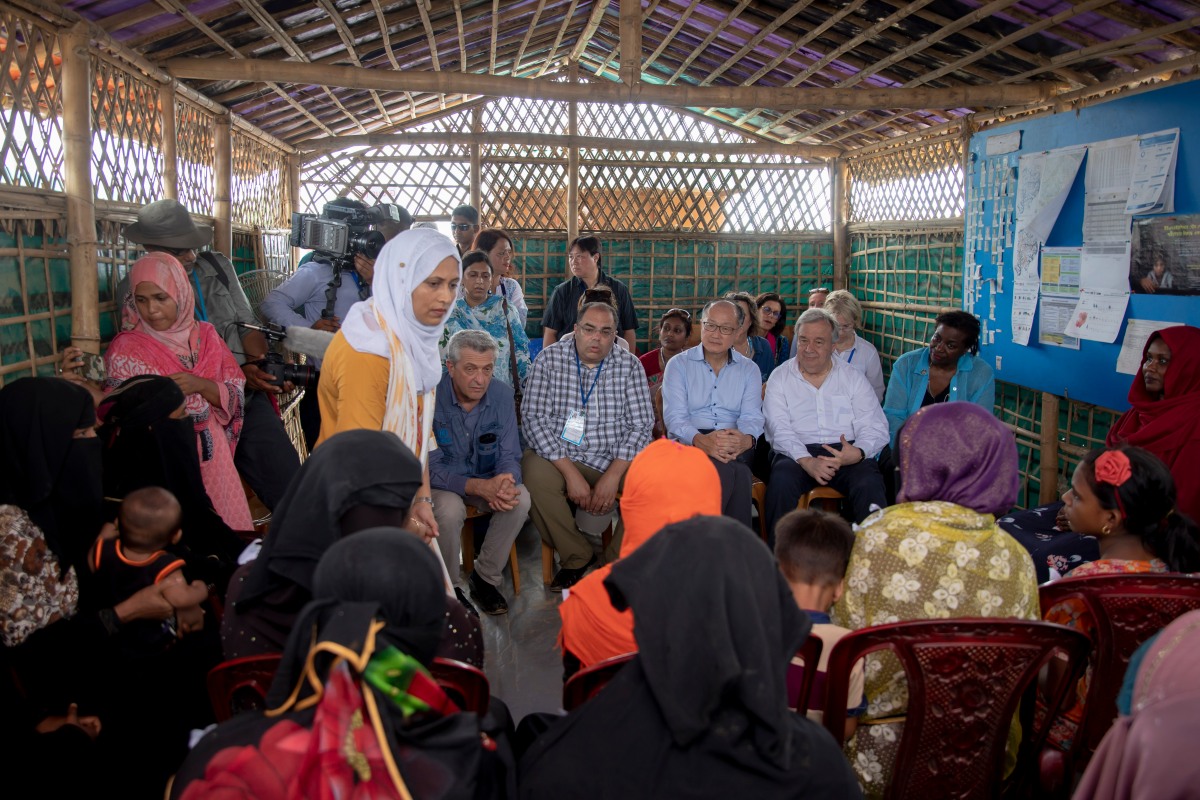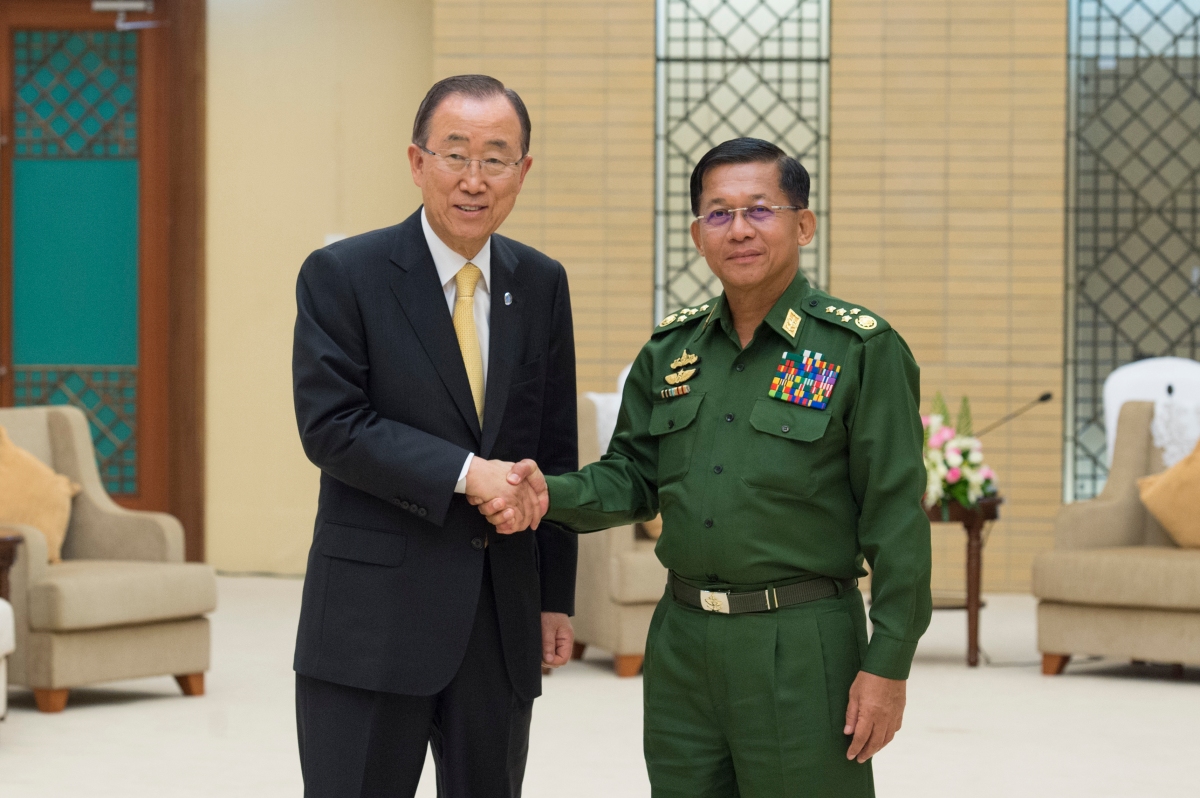This text first appeared on Strife Blog hosted at the Department of War Studies, King’s College London.
Engaging with severe human rights violations requires courage and coherence, setting clear principles and the readiness to stand by them if they are under pressure. An independent inquiry on the UN’s action during the Rakhine crisis in Myanmar, which came out in June, observed that the international organisation showed a “systemic failure” in dealing with the state’s repression of the Rohingya people between 2010 and 2018. Choosing his words carefully, its author, the former Guatemalan foreign minister Gert Rosenthal, echoed a similar exercise on the UN’s behaviour during the end of the war in Sri Lanka in 2008/09. Importantly, the UN system’s shortcomings were not a simple matter of failing to speak out, but of incoherence across the system, exacerbated by the lack of executive decision-making in Myanmar and at headquarters level. The lack of leadership by Secretary General Ban Ki-moon, despite his strong rhetorical commitment to human rights and atrocity prevention, deserves further attention.
From the UN’s perspective, the situation in Sri Lanka and Myanmar showed uncanny parallels, despite all objective differences. In Sri Lanka, the armed forces pursued a relentless final assault on the Tamil Tigers’ last hold-outs in Sri Lanka in 2008-2009. In Myanmar, the security forces attacked Rohingya civilians repeatedly, culminating in full-scale ethnic cleansing of the Rohingya population in 2017. In both countries, governments were the major perpetrators of violence, the presence of armed groups notwithstanding. Both governments were opposed to a strong human rights presence by the UN, and frustrated efforts by the UN Secretariat to increase its relevant capacity.
Myanmar and Sri Lanka, though both at the time host to significant armed violence, had successfully objected to any political or peacekeeping presence. The Resident Coordinators (RC), the head of the UN Country Team, in both countries had been chosen at a time of relative peace and with a strong development focus, not a profile in international humanitarian and human rights law. There were even some personal overlaps: Vijay Nambiar, the special advisor on Myanmar between 2012 and 2016, had been one of the most important UN officials during the Sri Lanka crisis, as Ban’s chef de cabinet. Lastly, there were strong geopolitical divisions that manifested themselves in a reluctance of the UN Security Council to discuss the situation as an official agenda item. In short, they were among the most difficult situations for the UN to work in.
The central challenge, as identified by Rosenthal, is a familiar and highly pertinent one: “how the United Nations can maintain some type of constructive engagement with individual member states where human rights abuses are systematically taking place, while at the same time pressing for those states to uphold their international commitments.” In other words, the UN needs to find an adequate mix of “quiet diplomacy” and “outspoken advocacy”, approaches that are associated with different parts of the UN system. For such a mix, the UN needs an inclusive organisational structure to produce a coherent policy, communicated across the system, owned by the leadership, and based on current, on-the-ground information and analysis.
The failure in Myanmar, according to Rosenthal, was that none of those prerequisites were present. Both at country and at HQ level, there were stark differences of opinion regarding the most adequate modus operandi. These manifested themselves in an increasingly polarised working environment, as a function of the high stakes involved in the crisis in Rakhine state. Both sides of the argument thought that the other approach was not only wrong-headed, but potentially dangerous and counterproductive to de-escalate the violence and reduce discrimination. The emotionally charged atmosphere explains the reports about critical individuals being excluded from key meetings by Renata Lok Dessalien. The UN also had difficulty accessing the most volatile areas of Rakhine state and providing independent monitoring after alleged incidents.
Perhaps most importantly, there was a lack of strategic leadership, not just at the country level, but also at the highest level of the UN system. Differences between Deputy Secretary-General Jan Eliasson, who pressed for advocacy, and Special Envoy Vijay Nambiar and UNDP Administrator Helen Clark, who stressed quiet diplomacy and development efforts, respectively, were never resolved by Secretary-General Ban. Rosenthal writes, “even at the highest level of the Organization there was no common strategy.”
These shortcomings are particularly salient because Ban and Eliasson had vowed to turn a page after the damning findings of the Sri Lanka inquiry. They launched the “Human Rights up Front” initiative in late 2013 with the aim to improve coordination, information management, engagement with member states, and the UN’s organisational culture. One of the new mechanisms established as part of the initiative was the so-called Senior Action Group (SAG). The SAG brought together the system’s most important parts at the top leadership level, including the UNDP Administrator, the High Commissioner for Human Rights, the Emergency Relief Coordinator, and other high-level officials. It was chaired by Deputy Secretary General Eliasson.
In the SAG’s discussion of the crisis in Rakhine state, Helen Clark, then UNDP administrator, protected UNDP and her RC, insisting that investing in development would also benefit the Rohingya, which should not be jeopardised by an overly focus on human rights advocacy. Allegations of specific incidents required more investigation, she often insisted. According to a UN official familiar with these discussions that I interviewed, “any time there was a contentious issue, a dilemma between quiet diplomacy, public diplomacy and so on, the differences were simply discussed, and no executive decision was taken.”
While the UNDP administrator is appointed by the Secretary General, he or she also reports to the UNDP Executive Board. At the time, Clark had the final say on appointing or replacing RCs. The UN official that I interviewed described her behaviour as “territorial.” In any case, Ban could have insisted on a common position on the Rakhine crisis, not the least since Helen Clark had officially signed up to Human Rights up Front. Eliasson, who knew the destitute situation of the Rohingya from his time as Emergency Relief Coordinator in the early 1990s, had pressed for the replacement of the RC as early as 2015. Still, Ban did not overrule Clark nor did he “arbitrate a common stance between these two competing perspectives,” as Rosenthal writes.
The lack of leadership was highly problematic: the whole purpose of such high-level meetings as the SAG was to deal with questions that UN officials at the country level had not been able to agree on, and to create a common analysis and joint ownership of decisions. The different perspectives are ingrained in the distinct mandates and ways of working of the parts of the UN system; it falls to the collective leadership of the UN system to resolve tensions arising from the operational work. “Systemic failure” sounds like the reasons for incoherence lie mainly in structural differences. While these are important, ultimately responsibility for ensuring that the whole UN system works falls to its leadership, including the Secretary General and member states.
Clearly, the UN system is subject to the same cleavages and divisions that characterise the international system as a whole. As Renata Lok Dessalien herself points out in a paper written after her assignment in Myanmar, conceptual differences regarding the meaning and interpretation of basic principles are ingrained in the UN Charter, for example between the promotion of human rights and the respect for national sovereignty. No internal UN reform such as Human Rights up Front can do away with those tensions, or abolish geopolitical differences. What it can do, and it has done with some mixed success, is change the way the organisation works, improving communication, analysis and decision-making procedures.
If the UN can hope to influence events in situations like those in Rakhine state in Myanmar at all, a coherent and coordinated policy across the whole system is a prerequisite. Otherwise both governments and critical member states are always able to play different parts of the system against each other, muting their respective effectiveness.
Luckily and despite significant opposition from key member states, the UN has started to improve its coherence in dealing with the crisis in Myanmar. Shortly after he came into office, Secretary General António Guterres appointed a permanent monitoring group within the UN, and prioritised strategic dialogue with Myanmar’s government, including State Counsellor Aung San Suu Kyi. He also championed a reform of the RC system. When Myanmar’s armed forces began their military offensive that included ethnic cleansing in Rakhine state in August 2017, Guterres resorted to public diplomacy. In a rare step, he wrote to the UN Security Council, urging its members to take action. Also in 2017, Renata Lok Dessalien finished her position as RC in Myanmar. Her successor, the Norwegian Knut Ostby, emphasized communication and principled engagement, for example threatening to reduce all but essential aid to IDP camps in Rakhine state if the government did not improve the Rohingyas’ freedom of movement. At the same time, renewed fighting between the ethnic Rakhine Arakan armed group and the government as well as continued denial of citizenship have left around a million Rohingya refugees stranded in refugee camps in neighbouring Bangladesh.
UN diplomacy consists of difficult balancing acts, in particular in dealing with unrepentant governments committing atrocities against their own population. Faced with an increasing emphasis of state sovereignty, including by the United States, Guterres has, at times, appeared to waver on human rights. If his prevention agenda is to succeed, he needs to mobilise all pillars of the UN to support each other, not just in Myanmar.


